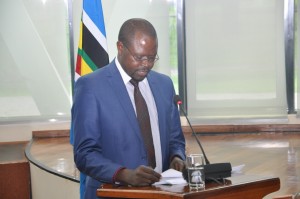East African MPs debate $110m budget proposals

While tabling the budget proposals for 2017/18, Maganda expressed concern about late remittances from EAC members and declining Development Partner support.
May 29—This week members of the East African Legislative Assembly, will debate the $110,130,183 budget proposals tabled last week by Julius Maganda, a state minister in Uganda’s Ministry of East African Community (EAC) Affairs. Uganda currently holds the chair of EAC Summit.
The figure is up from $101,374,589 for the previous financial year (2016/17), but according to sources still modest in light of the demands placed on the EAC Secretariat and its associated institutions.
However Maganda was bullish over the Community’s economic prospects. “The real GDP in the EAC is estimated to have grown by 6.1% compared to 5.8 % growth recorded in 2015,” he said.
He said growth was largely supported by investment in public infrastructure, buoyant private consumption and low oil prices. “Tanzania recorded the highest real GDP growth in the region, expanding by 7.2% in 2016, compared to a growth of 7.0 % in 2015. Kenya and Uganda recorded improved economic performance of 5.8 % and 4.8 % respectively in 2016, compared to 5.7 and 4.8 % in 2015. Rwanda recorded a decelerated growth of 6.0 % compared to 6.9 % in 2015. Real GDP in Burundi contracted by 0.5 % in 2016 compared to a contraction of 4.0% in 2015,” he said.
Once again, nearly half of the money or $52,868,638, is coming from Development Partners and this remains a cause of concern since EAC member states are known to frequently delay their remittances to the Secretariat in Arusha. The European Union is the leading multilateral donor to the EAC while Germany leads in bilateral terms.
For 2017/18, Partner State contributions through their relevant Ministries of EAC Affairs are expected to total $50,226,522. Member country ministries responsible for education will provide $4,848,431 and those for fisheries $1,549,254. Universities will come up with $303, 435 while miscellaneous revenue is pegged at $333,903.
Maganda told legislators, “Mr. Speaker, the key anticipated challenges during the implementation of Community programmes and projects include persistent delays in remittance of funds from Partner States and Development Partners and limited financial resources overall, with the budget declining yet the demand is increasing on the Community to deliver more services to East Africans. There is also reduced support from Development Partners”, the Minister said.
“Mr. Speaker, the Community will closely follow-up on the remittances by Partner States to facilitate timely implementation of programmes and implement the institutional review as per the directive of the 17th Summit of the Heads of State,” he said.
With the theme, ‘Accelerating Implementation of the EAC Integration Agenda’ the 2017/2018 budget prioritizes consolidation of the Single Customs Territory (SCT) to cover all imports and intra-EAC traded goods, infrastructure development in the region and further liberalization of free movement of skilled labour across the region.
Some $60,183, 201 of the 2017/18 budget is going to the EAC Secretariat while the East African Legislative Assembly has been allocated $17, 996, 959 and the East African Court of Justice, $4,140,166. The Inter-University Council for East Africa is getting $6,766,928, Lake Victoria Basin Commission ($11,960,643) and $2,466,655 is earmarked for the Lake Victoria Fisheries Organization. On their part, the East African Science and Technology Commission shall receive ($1,500, 164), East African Kiswahili Commission ($1,553,098) and the East African Health Research Commission ($2,225,324). The East African Competition Authority is to benefit from $1,337,045 in the Financial Year 2017/18.
Maganda said, “Delayed harmonization of national laws that impact on the implementation of the EAC Common Market Protocol and under-staffing, which is seriously impacting on effectiveness and efficiency in implementation of projects and programmes are other challenges, we need to address.”

 African Heads of state head to South Korea next week for Summit talks
African Heads of state head to South Korea next week for Summit talks
 Trading leads as main source of income for Ugandans
Trading leads as main source of income for Ugandans
 New leadership for bankers’ umbrella as total assets top $12 billion
New leadership for bankers’ umbrella as total assets top $12 billion
 Brussels Airlines to announce Nairobi service
Brussels Airlines to announce Nairobi service
 SITA promises enhanced travel experience after Materna acquisition
SITA promises enhanced travel experience after Materna acquisition
 Saudia’s 105 aircraft order stretches A320neo lead over rival Max
Saudia’s 105 aircraft order stretches A320neo lead over rival Max
